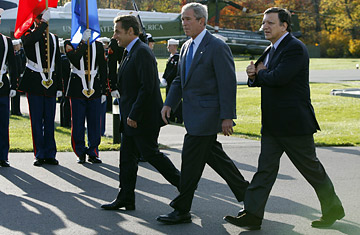
U.S. President George W. Bush (C) walks with French President Nicolas Sarkozy and European Commission President José Manuel Barroso (R) before their meeting at the Presidential retreat at Camp David
In normal times, a French President's call for an overhaul of the world's financial system would cause eye-rolling and dyspepsia among the world's free market purists. But these are not normal times: on the weekend, U.S. President George W. Bush echoed Nicolas Sarkozy's push for an international summit to that end, and on Monday world markets seemed to endorse the initiative with a positive fillip. Though the specific goals, attendees, and even exact date and venue of such a meeting have yet to be determined, the mere agreement by U.S. and European leaders to update the Bretton Woods system — which has overseen international finance for the past 64 years — reaffirmed hopes that a collective, long-term approach to the worst economic crisis since the Great Depression was on the way.
Alongside European Commission President José Manuel Barroso, Bush and Sarkozy called world leaders to join them at a monumental summit meeting in a U.S. city — probably at the United Nations in New York — shortly after the Nov. 4 U.S. presidential election. Following their huddle at Camp David Saturday, the trio issued a statement saying the extraordinary international congress would "review progress being made to address the current crisis and to seek agreement on principles of reform needed to avoid a repetition and assure global prosperity in the future."
That language scarcely matches the drama of the world financial crisis, but it did at least contribute to the modest optimism with which markets have attacked a new week of trading. Japan's Nikkei index climbed 3.6%, Hong Kong's Hang Seng rose 5.3%, and South Korea's Kospi jumped for the first time in a week: a 2.3% hike inspired in part by a $130 billion government assistance plan for banks announced in Seoul on Sunday.
Europe's leading bourses also began stronger, with London's FTSE 100 1.67% higher nearing mid-day Monday, while Paris CAC 40 gained 1.46% and Frankfurt's DAX up .8%. Futures trading in the U.S. similarly pointed to 2.4% opening advance Monday on Wall Street, though that early action could change as a series of company earnings figures are released, giving investors a better idea of how quickly U.S. economic growth has slowed.
Fears of a serious economic decline or even recession in the U.S. and world-wide explain the deep losses markets experienced last week after initially reacting with euphoria to the rash of government efforts to prevent finance and banking systems from imploding. As the week closed out, the global outlook was simply confused, as European indices generally finished higher, the Dow slumped 1.4%, and Asia's national markets featured both gains and losses.
Despite Monday's mostly rosier mood, there were developments that could have given markets as much to choke on than cheer about. Over the weekend the heads of French savings bank Caisses d'Epargne were forced to resign following revelations that unauthorized derivatives trading last week produced a $810 million loss. On Sunday, meanwhile, the Netherlands said it would inject a further $13.5 billion into troubled finance company ING — another indication that European banks may not yet have entirely accounted for all the toxic debt they assumed.
Still, markets were more inclined to take heart in the international summit agreement Sarkozy had obtained from Bush. Despite that advance, questions remain how much the U.S. and its free-market fans will the more invasive regulatory approach that Europe seems to favor. Even as they face dire economic crisis, Americans are quicker than Continentals to distrust perceived market "socialism." Indeed, even Bush and Sarkozy seemed to clash Saturday in how each weighed the virtues of regulation against the liberty of markets.
Not that it seemed to matter. "The fact that these are two conservative politicians that business leaders feel they can trust had a lot of impact," says French economist Bernard Maris, who also thinks markets were comforted by the decision to hold the conference in the U.S. — with an eye to historical continuity with the 1944 conference in Bretton Woods, NH, that established the International Monetary Fund. But Maris also notes those same markets — whose boom years relied largely on minimalist regulation — should logically be freaking out at Sarkozy's calls to "moralize" finance and limit pay to the world's biggest earners. So why the calm?
"For now, markets are getting into life boats on the short-term imperative of saving their lives, and will work to restore 'good old days' rules once the economy is back on solid ground," Maris says. "There is a school of thought that the best way of doing nothing at all is to demand everything be changed — and what we've been hearing from Sarkozy and Bush has been totally counter to what they'd constantly maintained before." Perhaps for that reason, the new tone hasn't struck fear into the markets, but there are still plenty of grounds for volatility as further details are worked out.
